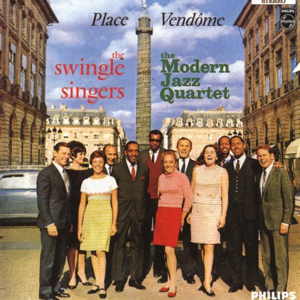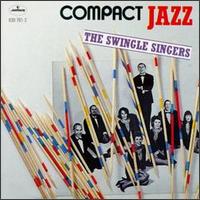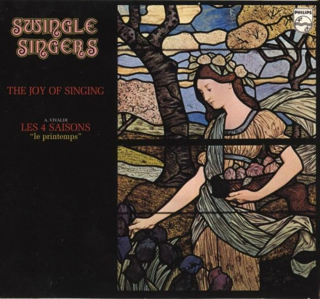
The Swingles are a vocal group formed in 1974 in England by Ward Swingle. The group replaced Swingle's earlier "Swingle Singers", formed in 1962 in Paris, France with Anne Germain, Claude Germain, Jeanette Baucomont, Christiane Legrand, Claudine Meunier, Jean-Claude Briodin, and Jean Cussac.

C minor is a minor scale based on C, consisting of the pitches C, D, E♭, F, G, A♭, and B♭. Its key signature consists of three flats. Its relative major is E♭ major and its parallel major is C major.

A major is a major scale based on A, with the pitches A, B, C♯, D, E, F♯, and G♯. Its key signature has three sharps. Its relative minor is F-sharp minor and its parallel minor is A minor. The key of A major is the only key where a Neapolitan sixth chord on requires both a flat and a natural accidental.

F major is a major scale based on F, with the pitches F, G, A, B♭, C, D, and E. Its key signature has one flat: B♭. Its relative minor is D minor and its parallel minor is F minor.

In music theory, B-flat major is a major scale based on B♭, with pitches B♭, C, D, E♭, F, G, and A. Its key signature has two flats. Its relative minor is G minor and its parallel minor is B-flat minor.

E-flat major is a major scale based on E♭, with the pitches E♭, F, G, A♭, B♭, C, and D. Its key signature has three flats: B, E, and A. Its relative minor is C minor, while its parallel minor is E♭ minor.

A-flat major is a major scale based on A♭, with the pitches A♭, B♭, C, D♭, E♭, F, and G. Its key signature has four flats.

A minor is a minor scale based on A, with the pitches A, B, C, D, E, F, and G. Its key signature has no flats and no sharps. Its relative major is C major and its parallel major is A major.

E minor is a minor scale based on E, consisting of the pitches E, F♯, G, A, B, C, and D. Its key signature has one sharp. Its relative major is G major and its parallel major is E major.
Flute repertoire is the general term for pieces composed for flute. The following lists are not intended to be complete, but rather to present a representative sampling of the most commonly played and well-known works in the genre. The lists also do not generally include works originally written for other instruments and subsequently transcribed, adapted, or arranged for flute, unless such piece is very common in the repertory, in which case it is listed with its original instrumentation noted.
Laszlo Varga was a Hungarian-born American cellist who had a worldwide status as a soloist, recording artist, and authoritative cello teacher.

Anyone for Mozart? is the third album released by the Swingle Singers. The album was a 1965 Grammy award winner for "Best Performance by a Chorus."

Anyone for Mozart, Bach, Handel, Vivaldi? is a CD compilation re-issue of music by the Swingle Singers. It combines tracks from two previous LP releases, Going Baroque and Swinging Mozart.

Rococo Á Go Go is the fifth album released by the Swingle Singers. The album was nominated for a 1966 Grammy award.

Place Vendôme is an album released by the Swingle Singers performing with the Modern Jazz Quartet. The album was a 1967 Grammy award nominee.

Spanish Masters is the seventh album released by the Paris-based Swingle Singers. All tracks from this album are also included on the 11 disk Philips boxed set, Swingle Singers.

Compact Jazz: The Swingle Singers is a compilation album of previously released tracks from 3 Philips Swingle Singers recordings: Place Vendôme, Getting Romantic and Spanish Masters.

The 2005 Philips boxed set, Swingle Singers is a compilation of all eleven of the Paris-based Swingle Singers' recordings made for Philips between 1963 and 1972. Ten of the eleven disks included in this boxed set had also been re-issued previously by Philips (Emarcy) in five "two-fer" compilation sets over the preceding five years.

The Joy of Singing, a.k.a.Les 4 Saisons is a 1972 album by the Swingle Singers on the Philips Records label. All tracks from this album are also included on the 11 disk Philips boxed set, Swingle Singers.
Helen Schnabel, née Fogel, was an American pianist. She was married to the pianist Karl Ulrich Schnabel.


















